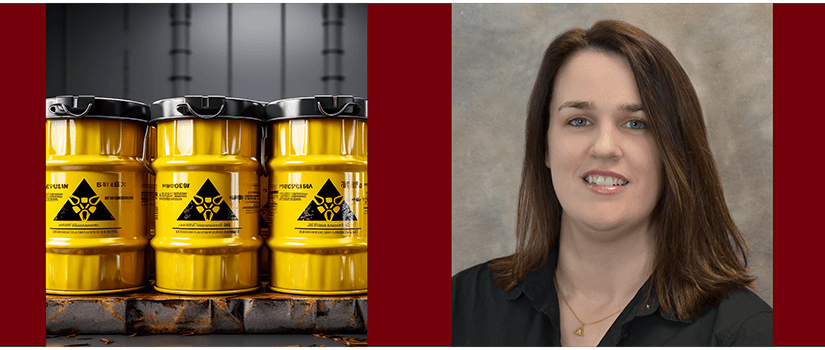College of Engineering and Computing (CEC) alumna Christie Sudduth was recently named chief engineer for United Cleanup Oak Ridge (UCOR) in East Tennessee, the lead contractor for U.S. Department of Energy (DOE) nuclear waste cleanup efforts. She is the first female to occupy the position.
Sudduth received her undergraduate degree in chemical engineering in 2009 and began her career at the Savannah River Site, working on flowsheets with a focus on corrosion and flammability issues. She joined UCOR in 2019 and worked her way up to management of the organization’s nuclear and criticality safety program before being named chief engineer. In her new role, Sudduth supervises 105 engineers and oversees a series of multi-million-dollar environmental cleanup projects across the DOE Oak Ridge Reservation.
According to the Society of Women Engineers, females represent one in five engineers in the U.S. workforce. Sudduth attributes her success in a male-dominated profession to her eagerness to ask questions and tackle problems head-on.
“I’ve never been one to shy away from asking questions or offering alternative solutions. That has been a big feather in my cap. I haven’t been afraid to take on problem projects and work hard to find solutions,” Sudduth says.
Sudduth also credits her accomplishments to the CEC, which allows incoming freshmen to declare a specific major. Unlike other programs, she immediately immersed herself in chemical engineering instead of devoting time to general coursework. She also participated in several internships that helped her develop career preferences.
“I was immediately involved in aspects of engineering that I wanted to do post-college, so it felt like more meaningful work,” Sudduth says. “I knew from a young age I wanted to be a chemical engineer, and USC’s program allowed me to hone in on it right away.”
CEC professors such as Melissa Moss, chair of the Department of Chemical Engineering, inspired her to be a leader in a male-dominated field.
“Dr. Moss was probably the most influential professor of my career,” Sudduth says. “She was the only female professor that I had in engineering, and she was a shining example of how you can succeed as an engineer while being in the minority.”
“I am so proud of Christie and her accomplishments. Her abilities and self-motivation were evident as a student. It is exciting to know that her dedication and drive have taken her so far,” Moss says.
But Sudduth’s path to success has not been without challenges. Early in her career, she often encountered outdated viewpoints and gender bias, which she worked hard to overcome.
“I had to navigate some instances when I was told to not be so loud in a meeting. I politely listened and figured out ways to respectfully get my point across,” she says. “Thankfully, success speaks for itself.”
Sudduth was also conflicted about giving up the technical side of her work for an upper management role. That risk was met with reward, and today Sudduth finds satisfaction in mentoring younger engineers.
“I still love the technical work, and I do miss being able to produce calculations on a daily basis,” Sudduth says. “But I also found I love mentoring engineers and teaching them to question things. I find a lot of reward in that aspect.”
Above all, Sudduth is fulfilled by the knowledge that she is making a difference through mentoring younger employees and improving the environment.
“I chose chemical engineering because I love process chemistry, and I wanted to help people in some way,” she says. “Nuclear waste is one of the biggest environmental risks in the nation. I can physically see the difference I’m making.”
